- Home
- G. Wells Taylor
The Forsaken - The Apocalypse Trilogy: Book Two Page 10
The Forsaken - The Apocalypse Trilogy: Book Two Read online
Page 10
“But I heard a group of living people were trying to get rid of all the dead people in the town. They asked them nicely at first, but the dead people had no place to go, and they had a right to stay in Severance, since most had lived there when they were alive. But the story goes that the living people believed the walking dead caused Change. That really wasn’t fair since they rose after it. It was just a matter of time before something bad happened.”
Dawn’s mother had brought her to Severance. The town was just a main street that you could see to both ends of with no buildings taller than three stories. It used to be a bigger place her mother said, but pointed to burned ruins as the cause of its shrinking. The forever child could still feel the thrill as her mother led her by the hand over the street’s cracked asphalt. It was so different from Nurserywood—she corrected herself—it wasn’t called Nurserywood in those days. People were just starting to come there to hide and had built a little village around old campgrounds. And they didn’t even have a giant yet.
She had heard about towns and cities in stories, but seeing one and hearing about them were two different things. She couldn’t remember anything before Nurserywood. Her mom told her sometimes the first years of a child’s life were like that. Nurserywood was like Severance since it had people and buildings—though in the forest, there were old cabins and rough shelters of woven branches, cloth and plastic. And there were no paved roads only paths. So her first sight of the town was surprising. In those early days, forever children were still numerous enough that they were still accepted as children. They hadn’t started to really scare anyone at that point and everyone was more worried about the dead.
Dawn saw her first walking dead man in Severance. It terrified her—and her mother too. Part of the reason they had traveled to Nurserywood was to stay clear of the Change and the dangers it brought. They weren’t in Severance five minutes before a dead man stepped right out of the rain.
They were taking shelter from a downpour by the eaves of an old building. People still got out of the rain back then, because they thought it might stop. But the building had boards where its windows should be. Her mother said that was not the way things were when she had visited a year before on a trading mission. They were snuggling under her mother’s long woolen cloak when the dead man appeared.
He hurried in with his collar pulled around his ears. One of his eyes was missing—just a hole of twisted flesh instead, and there was a great piece of skin hanging down from one cheek that exposed the teeth on that side. His clothes were like rags. He stood there looking terrible and awkward before staggering into the rain again and he was gone.
“So,” Mr. Jay continued, “the living people decided one day to chase the dead people away. And they did. They formed a big group, with the sheriff and the police helping, and they ordered every dead person out of town. The dead people didn’t know what to think; they were surprised by the action. Never imagined their neighbors could do this. So they left, and the living people celebrated.” Her friend chuckled sadly. “But that was a mistake. The dead people went harmlessly enough. It all looked fine and the people of Severance tried to return to their lives like nothing had happened. But the dead gathered just outside of town. They were angry—outraged being thrown out of their homes. And they decided to fight for what was theirs.” He rubbed his knees. “You see the living made a mistake. It turned out that they had the most to lose in a fight.”
Dawn’s mother managed to get a job cooking for a restaurant on the main street—she had coaxed the owner with the spices and recipes she brought from the fields near Nurserywood. For about two weeks Dawn helped at the restaurant. She could not remember the name of the place but remembered the owner was a black man who smoked too much. Dawn was happy at that time, if she did feel a little exposed and over-pinched. All the women in Severance loved her dark curls and her big brown eyes. They squeezed and pinched her every day.
But she could remember the man who owned the restaurant chasing dead people away, even if they just wanted a glass of water, and he pushed them from the sidewalk out front. She remembered him taking a big gun and going with the others to send the dead people away.
“One night, the dead decided that the time had come,” Mr. Jay said in hushed tones. “They had lived their lives in Severance, and they were not about to lose it in death.” The magician’s features flickered in the eerie candlelight. “So they marched into town. The living suspected such a thing might happen, and had kept a watch. So the dead people met a blockade of living people at the edge of town.” Genuine sadness softened his features.
“One story said a living man threw the first punch, and the other said the dead started it. But it didn’t matter it was going to happen anyway.” Mr. Jay pulled at his beard. “You’ve got to remember, this was fifteen years after the Change and these people were terrified—all of them. And things just exploded!”
Dawn could remember the night. She was napping in the little room the restaurant owner had lent them—her mother was still finishing up the last of the dishes. But Dawn came out of a dream into a nightmare. There were explosions and screams—the light that usually burned yellow outside their little room was gone. In its place was a blue-white flickering—like broken wires or lightning. More screaming followed, and the loud bang, bang, bang of guns. Then her mother screamed. Dawn ran out of the little room and into the strange blue-white light, her eyes blurry with sleep. She ran along the hallway that led to the kitchen. There was another scream and then a big crash of glass.
She hurried into the dining area and dove for cover behind the counter. There was a great dark group of people filling up the whole building. The air was musty and smelled of smoke. She didn’t recognize the people. Dawn remembered most that they were monsters in the eerie light—faces white and round-eyed and their hands were more like claws than fingers. There were loud sounds: snapping and cracking, struggling grunting, glass breaking and crunching under foot, and screaming and screaming.
When she finally gathered her courage to look up again—the restaurant was empty. Both of the big windows were broken; chairs were thrown around and tables upset. She had a stark memory of a man’s leg lying under a table looking strange, it sock and shoe twitching. There was nothing else. “Mommy?” was all she could say.
“And so the story goes that the whole town burned that night.” Mr. Jay grew more somber with the telling. His eyes were sad. “And when authorities finally got there to help, there was no one left. There were a few dead people limping and crawling, too badly damaged to go wherever the others went or tell what happened—but I never heard more than what I’ve told you. No one else was ever found.”
“But, so.” Dawn’s eyes felt heavy with the memory. “What do you think happened?”
“Nobody knows, Dawn.” Mr. Jay moved over, knelt beside her and rested a hand on her forehead. “Nothing good.”
The forever girl couldn’t remember much more. She could remember a terrible feeling, little more and she could conjure up images of blood and destruction—and loneliness for days and days. And she remembered trying to find Nurserywood and hiding and eating garbage and sneaking into old buildings to get cans of food. She didn’t know how long she wandered. But wherever her spirit had gone for that time, she remembered it first coming back when she heard Mr. Jay singing by a campfire.
18 – Morning After
Sister Karen Cawood woke with the smell of liquor and cigarettes hot and suffocating around her face. Her stomach lurched and she gasped, gulping for air. Above her, flickering fluorescent light burned through her eyelids. She pushed at the sheets with numb hands, wrestled them off her body. Kicking, she rolled over. A man grumbled. Pressed to her right side was a thick muscled back, skin as black as soot. She squirmed, turned the other way: another man. This one was white, completely covered with tattoos. An orange moustache drooped away from his lips.
He smiled blearily and growled, “Hey baby!”
She pushed away di
zzy, vomit rising in her throat. Head lifted, waves of sickness buffeted her. Naked, she wobbled to her knees. The tattooed man pulled at her forearm—snarling and nauseous she slapped at him. He laughed.
The black man rolled over, his face gray. “Chill out, baby.” A long fingered hand reached out to steady her. “It’s late. You’re at my place…”
“Don’t touch me!” She pulled away, pressing her hands to her face; their sour smell turned her stomach.
“It’s just me,” said the black man. He turned his harsh gaze at the other man. “What the fuck you do to her, Sam?”
“Nothing man! I crashed just like you and now she’s going all—fuck!” The tattooed man pushed himself up on his elbows. “She’s just coming down man, freaking out.” He scratched at his pierced genitals, and Cawood slapped a hand over her mouth, barely catching the vomit.
We drive you from us, unclean spirits all satanic powers, all infernal invaders, all wicked legions, assemblies and sects.
“Oh, fuck baby!” The black man frowned. She knew his name, but couldn’t find it. “Shit, man she sicked up in the bed!”
“Not my fault.” The tattooed man lit a cigarette. “Anyways, she wasn’t sick earlier.”
“Sorry…” Cawood muttered from behind her slimy hands, and then tumbled off the bed. Her breasts and belly slapped the cold tiles. A beer bottle rolled noisily away.
“You’re right man!” the black man said and laughed, distracted from his own hangover. Cawood crawled away. “Maybe she eat too much.”
“Yeah, sister ate lots!” Sam chuckled. “Fuck, that’s a sweet ass!”
Cawood vomited harshly, noisily.
“She drank too much,” Sam murmured. “Drank me dry anyway.” They both laughed. “Fuck man, what time is it?”
Half blind, her vision and mind jumping, she pushed at a pile of clothing on the floor looking for her own.
“Fucking late…not even morning,” the black man groaned, watching Cawood. “Don’t make a mess, baby. Fuck!”
Cawood’s chest was constricted by dry heaves and darkness. Emotional sickness welled up from her consciousness. She wiped at a string of spittle. There was another. Where was the other man? Her mind replayed a sick image—the other man on top of her—and a man below, the black man—Dave. The other, the white man with sandy hair—her abdomen ached. Her whole body ached. Where was the other?
“Just remember shooting that fucking shit was your idea, Princess,” Dave snarled and pointed. “Your idea.”
Cawood found her miniskirt and jacket—the material was cold and damp to the touch but it covered her. She barely heard the words. “What did you give me? The drug…RUFI’S?” There were fingernail scratches on her stomach. “What did you say? Shooting what? Drugs?”
“Oh shit,” Dave said, and Sam started laughing. “I knew that was going to happen. But we got you on film saying it was your idea…don’t get all holy roller on us now, sister.”
A tremor of panic started below the level of her pain and worked upward, rising slowly at first then increasing in speed as realization sunk in. “Filmed it?” The throbbing pain in her brain disappeared with the thought. “Filmed what?”
“Your idea, we just was gonna fuck.” Dave found the energy to sit up now. “You wanted us to film it while the three of us fucked you blue.” He elbowed Sam and they laughed.
The other man grinned. “And we said, what the fuck. Let’s give the bitch what she wants.” He laughed. “Turned out, you fucked us blue!”
“You can’t.” Realization paralyzed her. No. No. No. Snapping out of it, she searched the pile of clothes for her stockings and shoes. “You’ve got to give the film to me.”
“Can’t.” Dave paled. “Raul took his camera home with him.”
“No.” A fresh wave of nausea rose and she vomited again. The men laughed. “You can’t do this.”
“Sick up in the can, baby,” Sam said. “You’re getting that all over!”
The drugs and alcohol were still distorting Cawood’s senses, still shielding her from the full realization of events. No big deal. Not as bad as it looks! She fumbled into her shoes and pushed her hair from her eyes. I can handle this. Her mind spun away from the scene.
“You one hungry pussy, baby,” Dave said, a carnal wave washed over his features. He fished his penis out of his boxers. “What about me and Sammie do you one more time. They say it cures a hangover.”
Choking back bile, Cawood turned from them and hurried shakily down the hallway away from them. Their catcalls chased her. Her numb fingers barely worked the lock on the door. Then she was in a hall outside, careening, spinning into doorjambs and walls. She could think of nothing. Her legs were wet now as liquids spilled from her body. The thought doubled her over with dry heaves.
She had to get home, had to get to her apartment before her neighbors woke up. Terrified, she lurched down two flights of stairs and was in the street. Cawood didn’t recognize the neighborhood. Casting around, she didn’t know the Level. It was deep though. A dead man staggered along the sidewalk toward her and passed. His round eyes were wide with interest or terror.
The dead on the street. At most Level Two if she was lucky. She had no watch, no idea of the time. Headlights cut along the road. The nun waved at the cab. It slowed. She dove into the back seat without looking at the driver. She kept her face shielded with her hand. Voice, harsh and bitter she grated out her address. As the taxi sped from the curb, Cawood sank into her terrified thoughts.
19 – Sunken City
The Sunken City was a perfect place for Demons to make their terrestrial lair. Their Infernal residence was the Pit, but traveling to and from the nether regions required considerable energy. By setting up shop in the Sunken City they could make better use of their powers while easily deciding who would come and go.
After the hit on Stahn, Felon had returned to his hotel where he received word that Baron Balg would make final payment aboard his yacht the following morning. The minor change in plan raised internal alarms, but the assassin always expected a double cross. If Balg did anything stupid Felon would make it more expensive than a bit of gold. That was why betrayal was so unlikely. Demons enjoyed nice long lives in the world after the Change, and it was only money. Meeting in the Sunken City was yet a quirk of the Demon’s massive ego.
The Coastview desk clerk told him to join Mr. Wurn at pier 22 no later than 9 a.m. Felon took a cab to the harbor and found the pier among the battered hulks of freighters.
He watched Mr. Wurn where he worked the trawler’s controls. Balg’s servant looked like something that belonged under a bridge. He had lurched out of the morning fog and motioned for the assassin to follow. The troll’s features were human, but distorted and grossly over-sized. His nose was easily a foot in length, which stood out, because Wurn was three and a half feet tall. He had thick, powerful arms that he had to keep bent while walking or let his knuckles drag. Something supernatural had made him. Wurn had obvious native strength, but the simple activities of life were a chore for him. His breath came in ragged gasps, and sweat poured from him continuously. His eyes were tiny and red, though they held quick, if tormented, intelligence. Wurn wore greasy coveralls, and smelled like vomit.
He had led Felon to an old fishing trawler, and quickly set course for the Sunken City. Some twenty minutes into the journey, Felon moved to the bow to stay clear of the troll’s stench. It was a struggle to keep a cigarette lit in the damp, misty air.
They followed an indirect route away from the ancient bridges—collapsed and eroded now. There was too much wreckage around the crumbled buttresses to be safely navigated. Looking at the destruction, Felon remembered the fires and riots in the early Change.
Felon didn’t waste words on Wurn. He knew that Demons had control over their own body shapes, and could change them with little effort. And he knew that they, like Angels, could manipulate matter to create whatever they needed from raw materials around them. Looking at the troll, it seemed they
could work their magic on living flesh as well. It amazed him that Wurn was sent to get him. The Demons were growing powerful, or foolhardy to allow something like the troll so close to people. Wurn was no genetic screw up. Felon had always suspected that down deep Demons feared humans and their position in the Divine hierarchy. But Wurn was an open challenge. The Demons thumbed their noses at humanity, Fallen and the Angels. They were putting the City of Light on notice.
“Master Balg expects you.” Wurn’s guttural syllables flopped across the deck like fish. He had left the small wheelhouse and approached. His lips were the size of cucumbers, swollen beyond useful communication.
Felon glared.
“Master Balg says you are a great man!” Wurn smiled revealing large broken teeth.
“Shut your fucking mouth!” Felon snarled and drew on his cigarette.
Wurn scratched the thin fur on his sparsely covered head, and returned to the wheelhouse. The troll’s face appeared in the small window, weighing the assassin with nervous glances. He mumbled worriedly to himself.
Felon wondered why the Demon wasted flattery on a hired gun. Balg had neither the need nor the inclination. Demons rarely threw compliments around, and if they did, it was always for a reason. Why? Was it sugar coating to coax him into recklessness? Was it an attempt to flatter him into thinking he was something he was not? Was Balg trying to lull him into a false sense of security or were the words delivered to buy the assassin’s favor? Did it suggest that Balg was afraid? He had just proven yet again that he could kill Demons—that he possessed the ability to surprise members of the Infernal host.
Or, was that question proof of his first proposition at work? Felon knew that he should never underestimate a Demon, and here he was actually thinking that a one might fear him. Perhaps that was why Wurn had been instructed to flatter him—if there was a reason. Already, Felon’s thoughts had turned inward, decreasing his reaction time a degree. The assassin knew that it only took a second to die. The compliment had already cost him a minute.

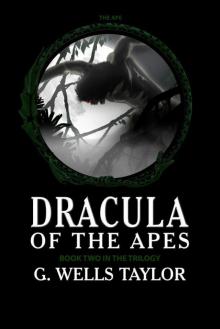 Dracula of the Apes 2
Dracula of the Apes 2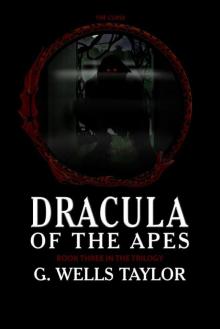 Dracula of the Apes 3
Dracula of the Apes 3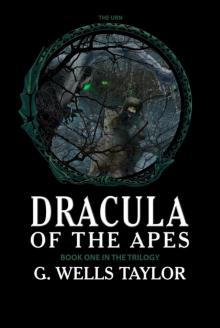 The Urn
The Urn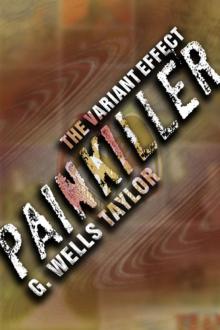 Painkiller
Painkiller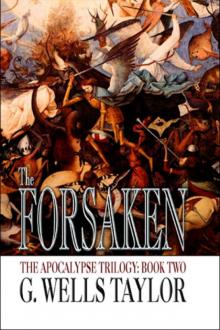 The Forsaken - The Apocalypse Trilogy: Book Two
The Forsaken - The Apocalypse Trilogy: Book Two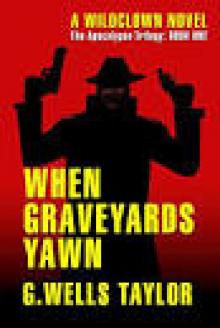 When Graveyards Yawn
When Graveyards Yawn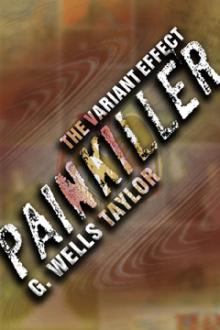 The Variant Effect: PAINKILLER
The Variant Effect: PAINKILLER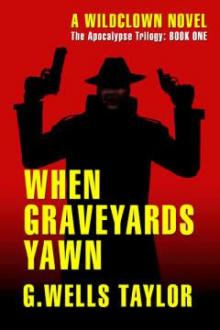 When Graveyards Yawn ta-1
When Graveyards Yawn ta-1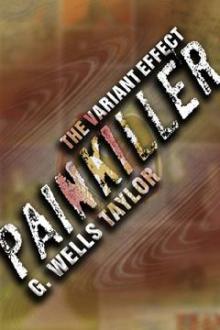 Painkiller tve-2
Painkiller tve-2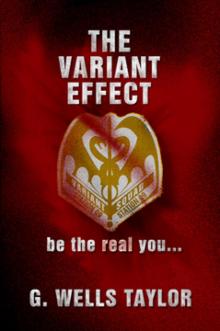 The Variant Effect
The Variant Effect